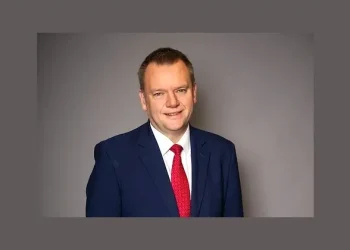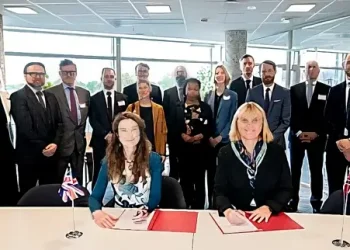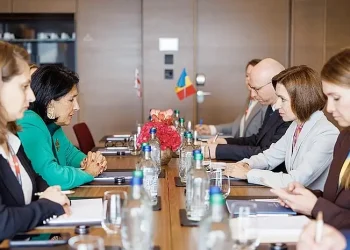Luxembourg, October 14 – British Foreign Secretary David Lammy joined the EU Foreign Affairs Council for the first time in over two years, illustrating a pivotal shift in UK-EU relations.
In a bid to reset ties post-Brexit, Lammy participated in crucial discussions on pressing international issues, including the Ukraine conflict and the escalating situation in the Middle East.
UK and EU Collaborate on Global Security
After an extended period of post-Brexit disengagement, the UK’s presence at the council is not just symbolic; it reflects an evolving relationship as Europe navigates two critical international crises.
Lammy’s attendance comes at the invitation of Josep Borrell, the EU High Representative for Foreign Affairs and Security Policy, emphasizing the UK’s commitment to collaborate more closely with its European counterparts.
The focus of the Luxembourg meeting is twofold:
- Ukraine: Addressing continued Russian aggression and supporting Ukraine through coordinated efforts.
- Middle East: Tackling the crisis, including the challenges posed by Iranian influence in the region.
Lammy’s participation underlines the UK’s belief that, as he stated,
“UK security is indivisible from European security.”
This sentiment reflects a broader understanding that despite Brexit, the UK’s safety and foreign policy goals remain deeply intertwined with those of its European neighbours.
UK’s Diplomatic Return: An Opportunity to Lead
The Luxembourg meeting signifies more than just diplomatic gestures; it’s a strategic move to reset relations and take action. Prime Minister Rishi Sunak’s recent visit to Brussels set the tone, advocating for practical cooperation beyond Brexit.
Lammy’s appearance is part of this broader strategy to show that the UK is prepared to work side by side with Europe, particularly in tackling the seismic challenges Europe and the world currently face.
The meeting not only provides an opportunity for UK involvement in discussions but also allows the country to influence European responses to these crises directly.
The Foreign Secretary highlighted this point, stating:
“This visit is an opportunity for the UK to be back at the forefront, discussing the most pressing global issues with our closest allies.”
UK-EU Cooperation in Action
The collaboration between the UK and EU on Ukraine serves as a compelling example of what can be achieved when both entities align their efforts. Together, they have:
- Imposed Sanctions: Joint sanctions against Russia have deprived it of billions in funding, weakening its capacity to continue aggression.
- Military Training: The UK and EU have coordinated training initiatives for Ukrainian troops, equipping them with necessary skills and expertise.
- Humanitarian Support: Joint efforts have targeted essential humanitarian aid to the areas most affected by the conflict.
UK-EU Cooperation Initiatives |
Impact |
|---|---|
| Joint Sanctions | Billions deprived from Russia |
| Coordinated Military Training | Enhanced Ukrainian defense |
| Humanitarian Support | Aid for conflict zones |
These actions showcase the tangible results of UK-EU collaboration, reinforcing the Foreign Secretary’s statement that Europe and the UK are stronger together when tackling common threats.
Diplomatic Reset: What This Means for the Future
Lammy’s attendance is just the beginning of what is expected to be more frequent engagement with the EU on matters of international security and foreign affairs. The UK’s involvement in the EU’s Permanent Structured Cooperation (PESCO) military mobility project is already underway, indicating increased alignment on defense strategies.
The Foreign Secretary’s visit signals further cooperation in areas such as climate policy, where linking Emissions Trading Schemes (ETS) and securing agreements on critical raw materials are potential avenues for collaboration.
As the UK and EU look towards the upcoming review of the UK-EU Trade and Cooperation Agreement (TCA) in 2026, discussions in Luxembourg could set the stage for deeper ties not only in security but also in climate and economic policies.
These cooperative efforts aim to benefit not just European stability but also the UK’s long-term economic and diplomatic interests.
A United Front Against Global Challenges
Lammy’s presence in Luxembourg suggests a renewed chapter in UK-EU relations, one where the two entities work in unison to address global threats.
The Middle East crisis and Russian aggression in Ukraine require cohesive responses, and the UK’s participation in these discussions highlights its willingness to be a key player in European and global affairs once more.
By resetting diplomatic ties and pursuing strategic partnerships, the UK aims to build a future where collaboration, rather than separation, is the defining feature of its relationship with Europe. As Lammy noted, the UK’s return to the European political arena is crucial not only for Britain but for the security of the continent as a whole.
In Conclusion
This development not only marks a significant step in the UK’s post-Brexit foreign policy but also sets the tone for how the UK and EU might collaborate on international issues, thereby ensuring that they present a united and effective response to the challenges ahead.
Moreover, this cooperation lays the groundwork for future joint endeavors, fostering a cohesive and strategic approach to global problems.
Sources: THX News, Foreign, Commonwealth and Development Office & The Rt Hon David Lammy MP.









